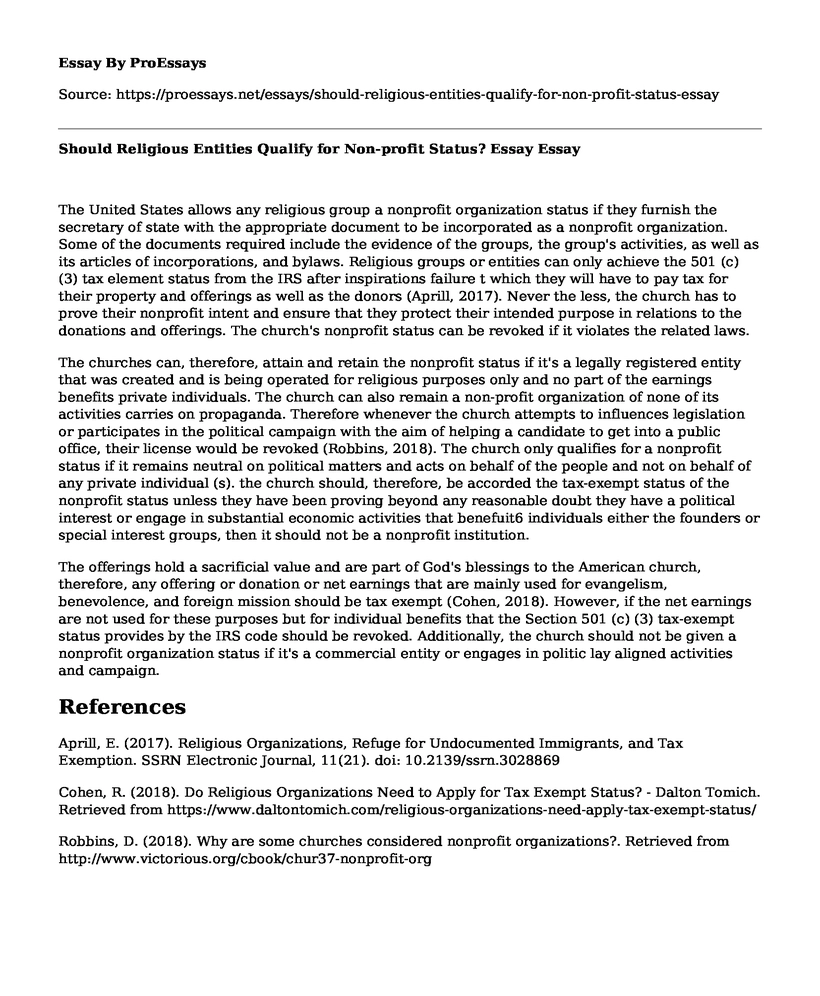The United States allows any religious group a nonprofit organization status if they furnish the secretary of state with the appropriate document to be incorporated as a nonprofit organization. Some of the documents required include the evidence of the groups, the group's activities, as well as its articles of incorporations, and bylaws. Religious groups or entities can only achieve the 501 (c) (3) tax element status from the IRS after inspirations failure t which they will have to pay tax for their property and offerings as well as the donors (Aprill, 2017). Never the less, the church has to prove their nonprofit intent and ensure that they protect their intended purpose in relations to the donations and offerings. The church's nonprofit status can be revoked if it violates the related laws.
The churches can, therefore, attain and retain the nonprofit status if it's a legally registered entity that was created and is being operated for religious purposes only and no part of the earnings benefits private individuals. The church can also remain a non-profit organization of none of its activities carries on propaganda. Therefore whenever the church attempts to influences legislation or participates in the political campaign with the aim of helping a candidate to get into a public office, their license would be revoked (Robbins, 2018). The church only qualifies for a nonprofit status if it remains neutral on political matters and acts on behalf of the people and not on behalf of any private individual (s). the church should, therefore, be accorded the tax-exempt status of the nonprofit status unless they have been proving beyond any reasonable doubt they have a political interest or engage in substantial economic activities that benefuit6 individuals either the founders or special interest groups, then it should not be a nonprofit institution.
The offerings hold a sacrificial value and are part of God's blessings to the American church, therefore, any offering or donation or net earnings that are mainly used for evangelism, benevolence, and foreign mission should be tax exempt (Cohen, 2018). However, if the net earnings are not used for these purposes but for individual benefits that the Section 501 (c) (3) tax-exempt status provides by the IRS code should be revoked. Additionally, the church should not be given a nonprofit organization status if it's a commercial entity or engages in politic lay aligned activities and campaign.
References
Aprill, E. (2017). Religious Organizations, Refuge for Undocumented Immigrants, and Tax Exemption. SSRN Electronic Journal, 11(21). doi: 10.2139/ssrn.3028869
Cohen, R. (2018). Do Religious Organizations Need to Apply for Tax Exempt Status? - Dalton Tomich. Retrieved from https://www.daltontomich.com/religious-organizations-need-apply-tax-exempt-status/
Robbins, D. (2018). Why are some churches considered nonprofit organizations?. Retrieved from http://www.victorious.org/cbook/chur37-nonprofit-org
Cite this page
Should Religious Entities Qualify for Non-profit Status? Essay. (2022, Jul 26). Retrieved from https://proessays.net/essays/should-religious-entities-qualify-for-non-profit-status-essay
If you are the original author of this essay and no longer wish to have it published on the ProEssays website, please click below to request its removal:
- The Eucharist Sacrament, Sign, and Symbols Essay
- Essay Example on Coca-Cola: A Global Sign of American Flavor & Its Diversification Strategy
- Christian Missions: Spreading the Faith Across the Globe - Essay Sample
- Unlock Comprehensive Visibilities with IBM QRadar SIEM Solution - Essay Sample
- Paper Example on Integrating DESC & CR Models for Civility in Organizations
- Strategic STAR Method Application at Zara: Unveiling Supply Chain Challenges and Solutions - Free Report
- Executive Summary Example on Quality Improvement Initiative







